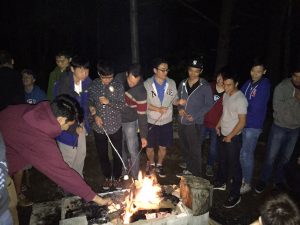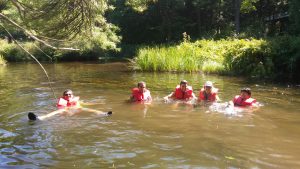Of all the courses Prof. Jennifer Drake has taught, CME358 – better known as Survey Camp – at Gull Lake is her favourite, in particular a special tutorial Drake runs: Marshmallow Roasting 101.
“Civil and Mineral Practicals (CAMP)–Survey Camp– is by far the most rewarding course to teach,” says Drake.
For any professor teaching environmental engineering, translating course material into real-world applications is difficult in an urban setting. “CAMP is a microcosm of everything that you use in a city; natural water systems, drinking water and waste water systems. While at camp we focus on water modules, hydrologic and topographical work, lake profiles, and soil identification.”
“Students learn in a real-time, life-size setting. They understand how the concepts and theories they learn in class relate to the real world,” explains Drake. “The experience helps students become well-rounded, better developed, passionate people which is what we want for our engineers.”Drake notes that there is a big difference between learning about stream gauging compared with doing it; having access to property north of the city is an invaluable tool and tremendous opportunity.
“Students have told me that camp is the most beautiful place they’ve ever visited; the wealth of Canada in terms of lakes and healthy nature really puts things in perspective. Our student population is highly urban, so survey camp is a unique experience for our students, one that creates memories and long-lasting learning.”
About CAMP
CME358, Civil and Mineral Practicals (CAMP) is a required course for all Civil and Mineral Engineering undergraduate students. The two-week camp instructs students in the art and science of land surveying, engineering project management, geology, hydrology, water treatment, woodlot management and sustainable energy.